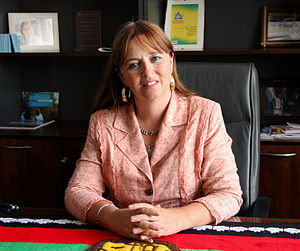Magdalena Odarda
Magdalena Odarda | |
|---|---|
 | |
| President of the National Institute of Indigenous Affairs | |
| Assumed office 10 December 2019 | |
| President | Alberto Fernández |
| Preceded by | Jimena Psathakis |
| National Senator | |
| In office 10 December 2013 – 10 December 2019 | |
| Constituency | Río Negro |
| Provincial Legislator of Río Negro | |
| In office 10 December 2003 – 10 December 2013 | |
| Constituency | Provincial list |
| Personal details | |
| Born | María Magdalena Odarda 8 December 1965 Córdoba, Argentina |
| Political party |
|
| Education | National University of Córdoba |
| Occupation | Lawyer, politician |
María Magdalena Odarda (born 8 December 1965) is an Argentine lawyer and politician who currently serves as president of the National Institute of Indigenous Affairs, under the Ministry of Justice and Human Rights.
She was previously a member of the Argentine Senate from 2013 to 2019, and a provincial legislator in Río Negro from 2003 to 2013.
Biography
Magdalena Odarda was born in Córdoba on 8 December 1965.[1] After graduating from the National University of Córdoba, she moved to the town of Sierra Grande in Río Negro Province.[1] There she worked as a teacher and advised various unions.
In 1999, she became a councilor in Sierra Grande.[1] In 2000, she was a legislative advisor, and in 2003 she became a provincial legislator representing the Civic Coalition ARI (CC-ARI). She was president of the party in Río Negro Province until 2015. In 2011, she was a CC-ARI candidate for governor of Río Negro, but she obtained only 5.34% of the votes, losing to Carlos Soria from the Front for Victory.[2]
In 2013, after going through the simultaneous and compulsory open primaries and obtaining 18% of the votes, Odarda won a seat in the Argentine Senate representing the minority of Río Negro for the Progressive Front Alliance, with 26.28% of the votes.[3] The election was won by the Front for Victory, headed by Miguel Pichetto, who obtained 49.95%.[4]
In 2015, she was a candidate for governor for the Progressive Front for Equality and the Republic, competing against Miguel Ángel Pichetto and Alberto Weretilneck. She finished third, with 10% of the votes.[5]
Odarda, as president of the Río Negro CC-ARI, like Pablo Javkin, president of the party in Santa Fe, decided to remain independent from the party's national order and not conform to Cambiemos.[6] In November 2017, the authorities and parliamentarians of the Rio Negro Civic Coalition decided to leave the CC-ARI and form their own provincial party, called RIO.[7]
In December 2017, the weekly Parlamentario ranked Odarda 9th among senators on its list of "most industrious national legislators".[8]
In December 2019, President Alberto Fernández appointed Magdalena Odarda head of the National Institute of Indigenous Affairs.[9]
References
- ^ a b c Veneranda, Marcelo (15 June 2020). "Magdalena Odarda, quién es la funcionaria que contrajo coronavirus" [Magdalena Odarda, Who is the Official Who Contracted Coronavirus]. La Nación (in Spanish). Retrieved 31 August 2021.
- ^ "Histórico triunfo de Soria en Río Negro: el peronismo será gobierno después de 28 años" [Historic Triumph of Soria in Río Negro: Peronism Will be in Government After 28 Years]. La Política Online (in Spanish). 25 September 2011. Retrieved 31 August 2021.
- ^ "Contundente, el FpV ratificó poder en Río Negro" [Forceful, the FpV Affirms Power in Río Negro]. Diario Río Negro (in Spanish). 12 August 2013. p. 16. Archived from the original on 10 June 2014. Retrieved 31 August 2021.
- ^ "Resultados Provisorios" (in Spanish). National Electoral Directorate. Archived from the original on 29 October 2013. Retrieved 31 August 2021.
- ^ "Amplia victoria de Alberto Weretilneck sobre Miguel Angel Pichetto en Río Negro" [Wide Victory by Alberto Weretilneck Over Miguel Angel Pichetto in Río Negro]. La Nación (in Spanish). Bariloche. 15 June 2015. Retrieved 31 August 2021.
- ^ "En el ARI cuestionan a Odarda por su candidatura en Río Negro" [In the ARI, Odarda Questioned About Her Candidacy in Río Negro] (in Spanish). ADN Río Negro. 9 June 2017. Retrieved 31 August 2021.
- ^ "Odarda se va del ARI y arma un partido provincial" [Odarda Leaves the ARI and Forms a Provincial Party] (in Spanish). ADN Río Negro. 13 November 2017. Retrieved 31 August 2021.
- ^ "Los legisladores nacionales más laboriosos de 2017" [The Most Industrious National Legislators of 2017]. Parlamentario (in Spanish). 5 December 2017. Retrieved 31 August 2021.
- ^ "Odarda, al frente del INAI" [Odarda, Head of the INAI] (in Spanish). ADN Río Negro. 19 December 2019. Retrieved 31 August 2021.
External links
- Magdalena Odarda at the Argentine Senate at archive.today (archived 25 June 2014)
- CS1 Spanish-language sources (es)
- Use dmy dates from August 2021
- Articles without Wikidata item
- Commons category link is the pagename
- Webarchive template archiveis links
- AC with 0 elements
- 1965 births
- Living people
- Members of the Argentine Senate for Río Negro
- Members of the Legislature of Río Negro
- National University of Córdoba alumni
- Politicians from Córdoba, Argentina
- Women members of the Argentine Senate